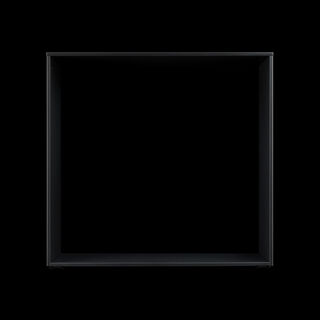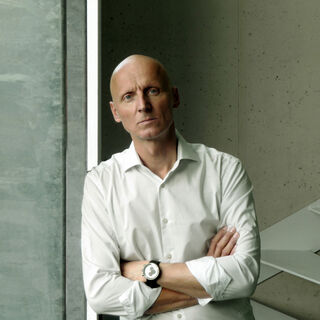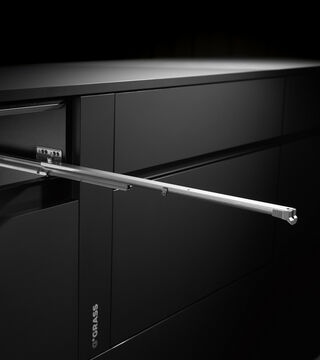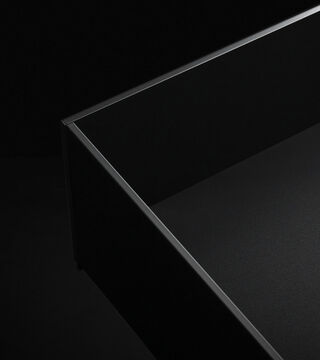Special edition 06/25
News.
In this special edition, we are reporting on our new management team and have directly invited them to an interview. You will get interesting insights into what the future direction of GRASS will be, which topics are in the focus and who the people behind them are. In addition, designer Stefan Ambrozus gave insights into his thoughts on current trends in the world of movement systems and also talked about the cooperation with GRASS. We will also be analysing our partnership with Canadian kitchen manufacturer Miralis.
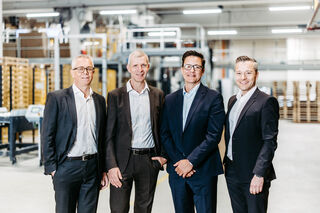
Decisions on an equal footing
Interview with the new management.
After a transitional phase, the recently formed management team will take on operational responsibility and thus set the course for a successful and sustainable future. The new Management Board consists of four members. Ercan Bal, former Managing Director of AT-GRASS, will continue to be responsible for sales and marketing. Werner Elender, former GRASS Group COO, returned to the company in January 2025, taking responsibility for technical areas.
Richard Anrig is new to GRASS Group as a member of the expert group since January, and he will be taking responsibility for commercial areas. He brings with him extensive experience as Managing Director of a production company within Würth Group. Thomas Stellberger completes the management team as the person responsible for production sites in Germany and the Czech Republic as Managing Director of GRASS Germany. Thomas Stellberger has been part of GRASS Group since 2010 and he managed the production site in Salzburg until August 2024 and most recently supported plants in Austria and Germany as Executive Operations Coordinator.
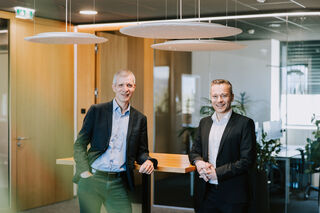
At the beginning of May, the new GRASS Management Board officially started got to work. In an interview with Martin Schaefer at GOOS COMMUNICATION, Ercan Bal and Werner Elender, two members of the new management quartet, explained the advantages of shared responsibility, their idea of evolutionary innovation – and what customer proximity really means today.
Four managing directors – does that really work? What was the reason for this realignment?
Ercan Bal: The management board was regrouped in May 2025 to add much more variety and consists of experienced personalities, some of whom are work in the industry, but also at the company itself. This guarantees operational stability and expertise that will help us reposition ourselves as quickly as possible and meet future customer expectations. In a company of this size, it makes sense to set up management so that each managing director is responsible for a specialist unit relating to their field of expertise. In this way, we avoid the bottleneck in corporate management and become significantly faster because we can spread the work across several shoulders.
Werner Elender: Exactly. We have been working together in this constellation since the beginning of the year and have seen that we have four different perspectives, but one common goal. Decisions are now made on an equal footing. As the saying goes: air is thinner at the top. Our advantage is that we can bounce ideas off each other. It may be the case that a sole managing director will come to a decision faster, but I dare to doubt whether this decision is then better.
"We see the future of GRASS in even closer customer proximity."
Ercan Bal
Director of Sales and Marketing
GRASS Group
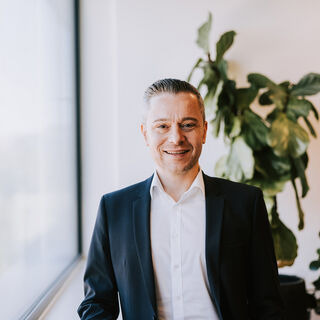
You mentioned a common goal of the new management. What's that?
Ercan Bal: We see the future of GRASS in even greater customer proximity and market orientation. Efficiency is at the heart of this – but not just internally, but also from the perspective of our customers. After all, what is efficient for us does not automatically have to be efficient for customers. That’s why we want to develop our solutions as part of a close-knit collaboration with our partners and establish a common understanding of creating value and effectiveness. It is also about identifying different customer needs as early as possible and using them to develop standardised, yet flexible product solutions. This requires a high degree of coordination and understanding of the process – and this is exactly what we understand by genuine customer proximity. It is important to us that our products not only impress with their functionality, but also with their differentiating design and clear benefits. GRASS remains an innovative, design-oriented company that deliberately sets itself apart from the competition through quality, aesthetics and sustainable solutions. Our goal is to set new standards through intelligent design and continuous evolution – both in terms of workmanship as well as the emotional experience for end customers.
Werner Elender: For us, innovation does not mean disruption all cost. We rely on evolution instead of revolution – on the further development of proven solutions. The aim is to design products so that they can be seamlessly integrated into existing processes for the customer. In this way, we create genuine added value without triggering complex changes. The great overlap between GRASS and its customers lies in the values: quality, efficiency and sustainability. We want to develop these values together – not through radical breaks, but through meaningful optimisations that bring benefits for both sides, which we develop in close cooperation with our customers and which give them the decisive competitive advantages. The message is: with GRASS, customers receive excellent craftsmanship and products that are durable, sustainable and also suitable for the development of individual solutions for living spaces. It goes without saying that design also plays a major role here: when designing living spaces, whether in the kitchen or for furniture in general, people are all about creating a beautiful home. Design plays a key role in this because it triggers emotions. When it comes to visible elements, the design quality makes the difference in purchases. And inner values are also increasingly emotionally charged. This makes good design and marketing essential in our opinion.
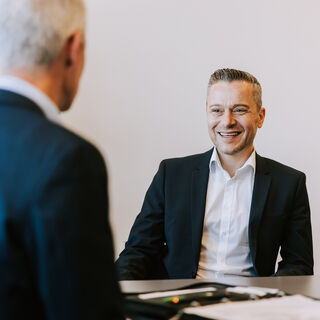
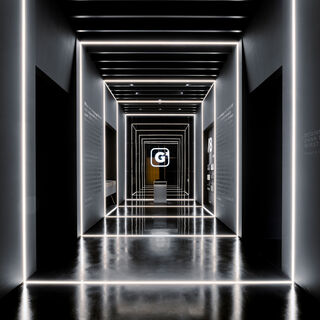
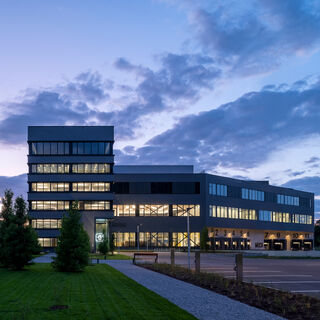
What role do international markets, especially in Europe, play for GRASS?
Ercan Bal: GRASS is currently strongly anchored in Central Europe and the USA – these are our main markets. Our focus on established markets has proven beneficial, especially now that protectionist measures on the agenda again in many countries. In the USA, we have purposefully expanded our presence – with our own production site and an increasing focus on regional market needs. This strategy enables us to identify domestic customer needs more quickly and satisfy them specifically. In doing so, we rely on differentiating design, high quality and solution-oriented developments that specifically stand out from the competition. At the same time, we are continuing to drive forward our internationalisation – with local partners, distributors and market-specific product and service concepts.
Werner Elender: Nevertheless, Europe remains our most important market. And in our core region in particular, we need new impetus – especially in the development of housing. There is a fundamental demand for housing, but the framework conditions are currently challenging: high interest rates, political uncertainties and a delay in the formation of new governments – for example in Germany or Austria – are slowing down investment. However, we are convinced that there will be a period of recovery after the crisis – and we are well prepared for that. GRASS will then be prepared as a solid, future-proof company – for our customers, partners and the entire industry.
GRASS is doing great in kitchens and bathrooms. Do you also intend to develop new markets in line with internationalisation?
Ercan Bal: Kitchens and bathrooms have historically been our core competencies and will remain so. However, we also see potential in other areas. Trends in the furniture industry, such as an increasing urbanisation and the associated smaller living spaces, require smart and space-saving solutions. In this context, we envisage applications within living spaces, in the office or even in special niche markets. It’s about transferring our hardware expertise to new areas and opening up new markets where our products can add value. We are staying true to our roots, but we are also expanding our horizons.
“GRASS is a company with a strong vision and a desire to constantly improve.”
Werner Elender
Technical Director
GRASS Group
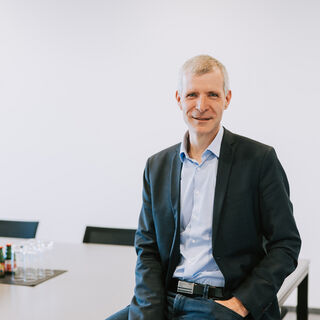
How does GRASS respond to current changes on the market? Key word: Stability in times of crisis.
Werner Elender: We are fortunate to be a family business within Würth Group. This gives us enormous stability and a long-term perspective, which is very beneficial to us right now. In the long term, we can focus on our strategic goals without having to constantly react to short-term fluctuations. This stability also gives us the opportunity to continue investing in research and development to bring innovative products to the market that meet changing customer needs.
Speaking of products: why did the company not attend interzum 2025 – are you withdrawing from the event?
Ercan Bal: Attending trade fairs is subject to continuous re-evaluation at GRASS in the interests of targeted customer contact. In as early as 2023, we received very positive feedback about our individual customer care at GRASS Experience Center in Hohenems. The direct exchange on an equal footing, tailor-made presentations and intense discussions in a tranquil atmosphere enable a level of depth that is difficult to achieve at large events. However, this does not mean a general departure from attending trade fairs – on the contrary: trade fairs such as SICAM or selected regional industry events remain important platforms for us, especially when it comes to speaking to product specialists, decision-makers and project partners. We value interzum as an international showcase for the industry and consider attending depending on the orientation and strategic focus. In 2025, our focus is on formats that are particularly focused on individual customer needs and a personal exchange.
“We rely on evolution instead of revolution.”
Werner Elender
Technical Director
GRASS Group
Some personal questions to round off the interview:
Mr. Elender, you have worked at GRASS before and then you took a break. How come you returned?
Werner Elender: That’s a good question! I returned out of conviction and with a great passion for the products. During my previous stint at GRASS, I already saw the products' enormous potential. The innovative power, quality and value of the products – that’s something that really fascinates me. It’s the opportunity to make a difference and develop. In the meantime, I’ve also got to know other companies, but GRASS has something special that has always appealed to me. The combination of innovation, high product quality and a focus on long-term relationships – with both customers and staff. It's the passion staff show here and the aspiration to always offer the best solutions. There is a high level of identification with the company and this is tangible in all areas. GRASS is a company with a strong vision and a desire to constantly improve.
You used to work more in the electronics sector – now you are more about mechanical systems at GRASS. What do you like about it?
Werner Elender: To be honest, I expected mechanics to be easier – but the opposite is the case. The precision required for a hinge or a drawer guide really surprised me. The tolerances are extremely tight, the requirements are high – sometimes electronics even seemed less complex to me in comparison. For me, the change was also about a conscious step beyond established patterns. I wanted to learn something new, develop myself. At the same time, I can contribute at GRASS with my electronics expertise, for example in automation. This combination of learning and contributing makes the role particularly appealing to me.
And what motivates you personally?
Werner Elender: People. I like working with people – professionally and at music society. I also like to move around in nature, preferably in the mountains. For me, both professionally and in my personal life, I want to create something together. And because I deal intensively with movement systems during the day, I naturally also do a lot of sports in my spare time.
Mr. Bal, what about you?
Ercan Bal: It's also the people for me. The people, the region, our team. I want to help GRASS remain strong – economically and as an employer. If I can do help the region and the people, this motivates me a lot.
Interview with Stefan Ambrozus
“The discovery of slowness”.
We caught up with designer Stefan Ambrozus by phone while he was travelling along the motorway, stuck between a hectic trade fair and relaxing in Berlin's surroundings. At his Studio Ambrozus, he has already come up with a number of classic GRASS products. A conversation about the fascination of technical design, production cycles in the hardware industry and the discovery of slowness.
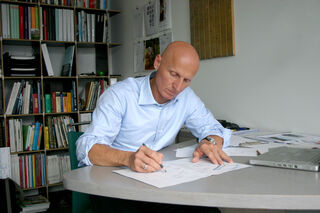
Mr. Ambrozus, you just returned from attending interzum. Was it exciting in Cologne?
Yes, I had two and a half intense days there. For us, it's on home turf because our office is in Cologne. With all its technical details and innovations, the trade fair is not an event that you can simply stroll through. You have to be very focused, and if in doubt, you also need to go on a tour to see the small, hidden things.
Was there anything you found particularly exciting or new?
Well, at interzum you usually don't see the big sensations that cause a wide-spread media echo, it's more about small, innovative steps. In the fittings industry, it is striking that currently visible sheet metal processing in the form of very simple geometries is en vogue, so-called simple box design. A drawer has become a very simple box again. This reduced design idiom is also reflected in corner fittings and organisational elements such as pharmacy cabinets. Muted tones from anthracite to black continue to dominate the colour scheme.
So, unlike furniture, movement systems are not focused on organic, natural shapes?
Organic shapes, as seen at EuroCucina from time to time, are not very much reflected in the fittings industry – you are too caught up in the production processes to focus on this. Fittings are design-related products, and the focus here is also on technology. As soon as you start to look at living room or kitchen furniture, it's a bit different. There is a counter-movement to gradually fading cubism and the eternal tendency to clear-cut design. But you also have to see: such shapes are usually more expensive to produce and are therefore difficult to establish on the mass market.
So there is a design difference between what is visible and purely functional parts?
Yes, you could say that when working on the “bodywork”, designers have a greater degree of freedom because they don't have to focus so much on function. When we work for GRASS or on our mechanical engineering projects, for example, this is more of a black box design. You often don't directly see our work, but it strongly influences the feel and user experience. We distinguish between the two segments in terms of “design from the inside out” or “design from the outside in”.
GRASS would then be “design from the inside out”?
Exactly.
What about this hidden design appeals to you as a designer?
At Studio Ambrozus, work is divided 50:50 between “inside out” and “outside in”. We are very happy to deal with technical projects. We can really get our teeth into these because we can bank on plenty of expertise in manufacturing technology – plus we are never fed up with the very specific guidelines that these projects entail – unlike other designers. We particularly like contradictions and challenges we have to overcome in terms of technology and design components.
What do you need to pay special attention to in this process?
We create subtle designs and try to integrate the components into the items of furniture as simply and integratively as possible. If technology is visible – for example a frame – we add selective design highlights. In any other case, it’s about creating as much impact as possible with as little formal visibility as possible. The thing is that good fittings go unnoticed while poor fittings have a tendency to stand out. End customers also appreciate it when drawers open and close smoothly. As a matter of fact, the movement is incredibly sexy!
It's our objective to develop products that are as integrated into the items of furniture as possible. Mediating might be the right term to describe it. This step is always very closely linked to the technicians. For example, with the GRASS Vionaro V8 – here it was amazing to see the result of collaborating with technicians on an equal footing. And it goes without saying that we try to add a design feature to the products beyond their function. Naturally, a visible drawer frame has more influence than, for example, an underfloor guide.
Aestheric design feature?
Exactly. Sometimes it’s about emphasising certain attributes. The durability of a door hinge, for example. It's fair to say that the fact that the hinge is robust is a technical characteristic. The product descriptions then describe the load capacity, but you can't see that. For end customers in particular, however, a hinge must also express this characteristic through its shape. That’s our job.
You mentioned Vionaro V8 earlier. How does cooperation with a customer like GRASS actually work?
We have been working with GRASS for a long time now, for around 15 years. That’s why we know each other well. When GRASS needs a new product, they approach us with objectives, often at a very early stage. This is important because the sooner we get involved, the more we can achieve together. It's an iterative process: We provide design suggestions, the Technology department evaluates them – and this is how the product is created step by step, for example Nova Pro Scala, Vionaro V8 or Tiomos. We have also overhauled existing products, such as an underfloor guideway. The aim was to make the fastening system more user-friendly. It was about the look and feel when I reach under my kitchen drawer because I spilled rice and need to take it out. To this end, we have optimised the feel of the handle outline so that customers can reach under their drawers and immediately know: aha, something happens when I pull here.
The supply industry is different from furniture manufacturers. Where do you currently see the potential for innovation?
In recent years, in terms of frames, it has been a race to find the slimmest construction – GRASS won the race with the 8 mm Vionaro V8. That was a great achievement. What you don't understand as a layperson: the fitting incorporates high-precision mechanical machining. It’s a great art to become so small – and perhaps this is also slowly coming to an end. But I find it exciting when I compare that to the lighting industry. In this context, there was a similar development a few years ago. When LEDs broke through, the question that drove everyone for a while was: who has the slimmest light? At some point, however, we reached a point where we noticed that there was no longer any product left. And companies realised that there was nothing to shape and no differentiation. It may be similar for fittings. Now we have the slimmest frame, it’s super aesthetic and it will last a long time – but maybe it won't continue in this direction.
Where are we heading? Or, alternatively: How do innovations come about in this area?
These always arise from the circumstances. We as designers and the product developers must also understand the context: How is the kitchen environment currently changing? How are people changing, and how are their behavioural patterns in the kitchen changing? Can we draw an impetus from these and react to them with products? You have to stay on top at all times. The good thing is, and that doesn't just apply to design, that you repeatedly think that you have reached the end of the line, how could you possible take it even further? And then there’s yet another surprise around the corner and you say: yes, of course, that’s plausible. It is therefore important to look at the changes that are taking place in everyday kitchen life and user behaviour – and to react to this in terms of design.
If you look at the fashion or other consumer industries, development cycles in the hardware industry are extremely long.
Yes, that’s right! Vionaro V8 is hot off the press, even though it has been on the market for several years. Personally, I like this pace. The fast-paced consumer goods sector is too hectic for me. As a person with a strong affinity for technology, it may also be too superficial to me. On the other hand, the fittings and supplier industry is basically the discovery of taking it slow. However, this is also necessary. Unlike a new T-shirt, investments are high, not only for the manufacturer, but also for the furniture industry. It's a marathon, not a sprint until it all pays off. This makes the industry stable. And sustainability is a by-product, so to speak: if a fitting lasts 20 years, it will usually result in a good life cycle assessment.
One more question about GRASS: do you have something like a signature design within the company?
Yes, we do. It is perhaps not as clearly defined as you in the visual segment, where a corporate design manual specifies where and how the logo must be placed. But there is an established design idiom: contemporary modernity; restrained, not intrusive. Products must not take centre stage. Visible elements, such as frames boast a contemporary design – not a retro look, but as universal as possible. And there is another aspect that is important: We try to create democratic design. What GRASS produces must make many customers happy and fit into a wide range of items of furniture. Consequently, we develop products that fit in well. Anything by GRASS must suit everyone's taste.
Wise words to conclude the conversation. Mr. Ambrozus, thank you for the interview.
Our partners in the spotlight
Miralis impresses with Vionaro V8.
Canadian kitchen manufacturer Miralis is an excellent match for GRASS. Its kitchens express a clear-cut design idiom, they are functionally well thought-out and crafted with attention to detail – details such as the sophisticated “Luminescence” lighting concept or an interior that has been equipped with the world’s slimmest steel frame, Vionaro V8 by GRASS, since 2023.
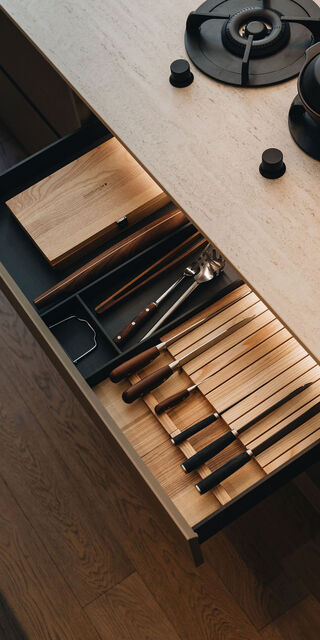
Miralis has an excellent reputation on the Canadian and North American markets: The Québec-based kitchen manufacturer exclusively uses high-quality materials and produces its bespoke kitchens locally. In addition to the vast selection of contemporary kitchen styles, the Canadians' furniture design surprises with thoughtful details: the “Luminescence” lighting concept, for example, combines reduced design with seamlessly integrated lighting – and is thus one of the Canadian manufacturer's design highlights.
Miralis’ holistic approach to quality is also reflected in the interior: high-quality components such as the GRASS Vionaro V8 drawer system are used in this context. The delicate steel frame with a wall thickness of only 8 millimetres and matt zirconium finish blends in discreetly with the furniture design – functional, durable, reduced to essentials. Vionaro V8 is not the only movement system that has convinced Miralis’ product developers: Dynapro and Tavinea are also used in their kitchens.
It is no coincidence that the two companies came together: both GRASS and Miralis share a common understanding of design, quality and technical consistency. The collaboration shows how proven systems can be flexibly integrated into individual furniture ranges – adapted to different markets, needs and styles. This creates kitchen furniture that not only impresses in terms of design, but also in terms of function.
